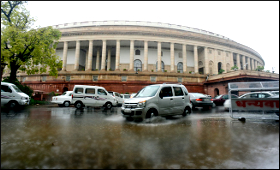|

|
Parliament's Monsoon Session ends on Friday, govt dubs it a 'success'
|
|

|
|
| Top Stories |
 |
|
|
|
SME Times News Bureau | 12 Aug, 2017
Parliament's nearly month-long
Monsoon Session ended on Friday, with the two houses recording a dip in
productivity compared with the last session.
The session began on
July 17, the day voting to elect the 14th President of India was held.
During the session, voting to elect the 13th Vice President was also
held on August 8.
During the session, the Bharatiya Janata Party
(BJP) also saw itself becoming the single largest party in the Rajya
Sabha after a fresh round of elections to the upper house.
Unlike
previous sessions, the upper house recorded a higher productivity
compared with the lower house, where the BJP along with its National
Democratic Alliance (NDA) partners, enjoys a majority.
According
to the data provided by the secretariats of the two houses, the Lok
Sabha's productivity was 77.94 per cent, significantly down from 114 per
cent during the Budget Session.
The Rajya Sabha's productivity
was marginally higher compared with the lower house at 79.95 per cent.
In the Budget Session, the upper house clocked around 93 per cent
productivity.
Productivity is the ratio between the scheduled number of hours and the number of hours the house actually worked.
Parliamentary Affairs Minister Ananth Kumar said that the government was happy with the session's outcome.
"It
has been a successful session in terms of legislative business
conducted and wide participation of all political parties in discussions
on various issues of national importance," Kumar said at the press
conference he addressed with Ministers of State for Parliamentary
Affairs Mukhtar Abbas Naqvi and S.S. Ahluwalia.
Ahluwalia said
the dip in productivity in percentage terms did not affect legislative
business done by the two houses, as the Lok Sabha passed 14 bills and
the Rajya Sabha nine bills.
"This session was short. In between,
there were holidays, there was the Presidential election, obituary
references, and there was also a day dedicated to discussion on the Quit
India movement. There were disruptions, even though we were ready to
discuss what they wanted..." the Minister said, adding that these
factors led to low productivity ratio.
"There was no affect on the legislative business, as both houses passed several bills," he said.
During
the Monsoon Session, the opposition protested over several issues,
including the agrarian crisis, withdrawal of cooking gas subsidy, and
stalking of a young woman by the son of a Haryana BJP leader.
Two
major issues that saw opposition protests were mob lynchings and cow
vigilantes, with members blaming the government of inaction. Gujarat
Rajya Sabha elections also led to much heat as the opposition Congress
alleged use of money and muscle power to influence its MLAs.
Ananth Kumar said though time was lost to disruptions, members compensated by sitting extra hours.
The
Lok Sabha lost nearly 30 hours to disruptions but sat for more than 10
hours extra. The Rajya Sabha lost around 25 hours, but members sat for
seven hours extra.
The bills passed during the session include
The Integrated Goods and Services Tax (Extension to Jammu and Kashmir)
Bill, The Banking Regulation (Amendment) Bill, The Right of Children
Free and Compulsory Education (Amendment) Bill, and The Right of
Children Free and Compulsory Education (Amendment) Bill.
Ananth Kumar called the passage of The Integrated Goods and Services Tax (Extension to Jammu and Kashmir) Bill "historic".
Supplementary
Demands for Grants for 2017-18, including Railways, and Demands for
Excess Grants for 2014-15 and related Appropriation Bills were discussed
and passed by the Lok Sabha.
These Bills were sent to the Rajya
Sabha on August 2, but could not be taken up for consideration but were
not returned to the Lok Sabha. As per the rules, the bills will deemed
to have been passed by both houses on August 15, the end of 14-day
period for returning a Finance Bill to the lower house.
The
session also saw External Affairs Minister Sushma Swaraj speak on the
stand-off with China along the country's border in Sikkim, as the upper
house took up a discussion on India's foreign policy.
|
|
|
| |
|
|
|
|
|
|
|
|
|
|
|
|
|
|
| |
| Customs Exchange Rates |
| Currency |
Import |
Export |
US Dollar
|
₹91.35
|
89.65 |
UK Pound
|
₹125.3
|
₹121.3 |
Euro
|
₹108.5
|
₹104.85 |
| Japanese
Yen |
₹58.65 |
₹56.8 |
| As on 19 Feb, 2026 |
|
|
| Daily Poll |
 |
 |
| What is your primary "Make or Break" expectation from the Finance Minister this year? |
|
|
|
|
|
| Commented Stories |
 |
|
|
|
|
|
| |
|